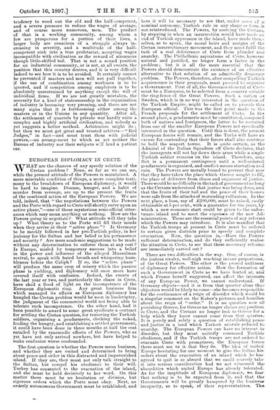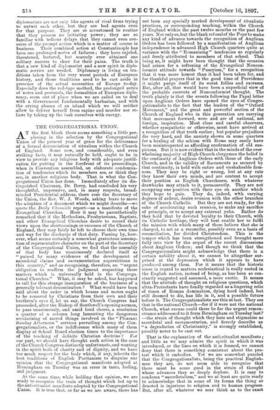EUROPEAN DIPLOMACY IN CRETE.
WHAT are the chances of any speedy solution of the Cretan problem ? None, so far as we can see, while the present attitude of the Powers is maintained. A more miserable condition of things, a more complete testi- mony to the breakdown of European diplomacy, it would be hard to imagine. Disease, hunger, and a habit of murder from revenge, are up to the present the fruits of the combined action of the European Powers. We are told, indeed, that "the negotiations between the Powers and the Porte with regard to Crete will shortly enter upon an active phase,"—one of those mysterious semi-official utter- ances which may mean anything or nothing. How are the Powers going to negotiate ? What attitude will they take up ? What theory as to the Porte will fill their minds when they arrive at their "active phase"? Is Germany to be meekly followed in her pro-Turkish policy, in her jealousy for the Sultan and her belief in his permanence and security ? Are mere academic suggestions to be made without any determination to enforce them at any cost ? Is Europe, misled by temporary success into a belief in the power and influence of the alleged Mussulman revival, to speak with bated breath and whispering hum- bleness before the Caliph ? If so, the "active phase" will produce the same crop of misery which the passive phase is yielding, and diplomacy will once more have covered itself with confusion. Indeed, the events of the last year or two, and particularly the chaos in Crete, have shed a flood of light on the incompetence of the European diplomatic ring. Any great business firm which managed its affairs as European diplomacy has bungled the Cretan problem would be soon in bankruptcy, the judgment of the commercial world not being able to tolerate such incompetence. On the other hand, had it been possible to award to some great syndicate a contract for settling the Cretan question, for removing the Turkish soldiers, organising a gendarmerie, clothing the naked, feeding the hungry, and establishing a settled government, it could have been done in three months at half the cost entailed by the spasmodic efforts of the Powers, who as yet have not only arrived nowhere, but have helped to make confusion worse confounded.
The first question is whether the Powers mean business, and whether they are united and determined to bring about peace and order in this distracted and impoverished island. If they are, they must not only talk straight to the Sultan, but compel his obedience to their will. Turkey has consented to the evacuation of the island, and she must be held decisively to her word. On this matter there must be no hesitation or division, but rigorous orders which the Porte must obey. Next, an orderly autonomous Government must be established, and here it will be necessary to see that, under cover of a., nominal autonomy, Turkish rule in any shape or form is not reintroduced. The Powers, by coercing the Cretane, by stepping in when an insurrection would have made an end of Turkish oppression in the island, have made then. selves, so to speak, the moral heirs and assigns of the Cretan insurrectionary movement, and they must fulfil the task of a real deliverance of Crete from plunder and anarchy. The Philhellenic aspirations of Crete, however natural and justified, no longer form a factor in the problem ; but it is all the more essential that the Powers should demonstrate the existence of an effective alternative to that solution of an admittedly desperate problem. The Powers, therefore, after compelling T u rkisie acquiescence in their proposals, must proceed ta organise a Government. First of all, the Governor-General of Cret.,_... must be a European, to be selected from a country outside the ring-fence of the Great Powers. Such a, nation as Sweden, which is in no way interested in the question of the Turkish Empire, might be called on to provide this European official. This was the first point made in the French proposals for the settlement of Crete. In the second place, a gendarmerie must be constituted, composed both of natives and foreigners, the latter to be recruited. from one of the smaller European Powers not specifically interested in the question. Until this is done, the present European forces will remain, and the Turks will have an excuse for contending that their forces shall also continue to hold the seaport towns. It is quite certain, as the Admiral of the Italian Squadron off Crete declares, that the insurgents will not lay down their arms while a single Turkish soldier remains on the island. Therefore, conk flict is a permanent contingency until a well-orderecl gendarmerie is organised, and conflict means starvation and ruin. The Powers are morally bound to prevent that now that they have taken the place which Greece sought to fill; the place of deliverer from chaos and organiser of justice: There would be no difficulty in the task of government so long as the Cretans understood that justice was being done, and that the fruits of their toil and the peace of their homer; were safe from the attacks of marauding ruffianism. In the- next place, a loan, say of £200,000, must be raised, easily obtainable at 5 per cent., with a guarantee for ten years, by which a new economic start could be given to the unfor- tunate island and to meet the expenses of the new Ad- ministration. These are the essential points of any reforms which the Powers may introduce. It is also manifest that the Turkish troops at present in Crete must be ordered to certain given districts prior to speedy and complete evacuation. Now, the question is,—Have the Powers sufficient determination, and do they sufficiently realise, the situation in Crete, to see that these necessary reforms, are immediately carried out ?
There are two difficulties in the way. One, of course, is the jealous rivalry, well-nigh reaching insane proportions„ of the Great Powers. The other is the proved unfitness of diplomacy for effective action. How the formation of such a Government in Crete as we have hinted at, and which France herself suggested, can affect the interests of any European Power, we cannot understand. If Germany objects—and it is from that quarter alone that objection would be likely to come—she becomes responsible- for the continuance of a reign of disorder which would be a singular comment on the Kaiser's pictures and homilies, about the reign of "order." It is no question now o0 punishing Greece, for Greece no longer claims any position in Crete, and the Cretans no longer look to Greece for a help which they know cannot come from that quarter_ It is purely and solely a question of establishing peace and justice in a land which Turkish misrule reduced ft. anarchy. The European Powers can have no interest int disorder, but they must unitedly command Turkisha obedience, and if the Turkish troops are not ordered tce evacuate Crete with promptness, the European forces there must see td it that they do. The idea of united Europe hesitating for one moment to give the Sultan hia orders about the evacuation of an island which he has agreed to quit is so absurd that we could scarcely take it into serious consideration had we not witnessed the- absurdities which united Europe has already tolerated:. As for the ineptitude of European diplomacy, we fear that nothing is to be expected from it, and that the Governments will be greatly hampered by the business, incapacity, so to speak, of their representatives. The diplomatists are not only like agents of rival firms trying to outwit each other, but they are bad agents even for that purpose. They are so accustomed to routine that they possess no initiating power ; they are so familiar with tedious delays that they cannot even con- ceive of the prompt action which is a matter of course in business. Their combined action at Constantinople has been one prolonged series of failures ; they have cajoled, threatened, lectured, but scarcely ever obtained one solitary success to show for their pains. The truth is that a new kind of diplomatist and a new spirit in diplo- matic service are needed. Diplomacy is living on tra- ditions taken from the very worst periods of European history, and those traditions need to be cast aside in presence of the actual necessities of Europe to-day. Especially does the red-tape method, the prolonged series of notes and protocols, the formalities of European diplo- macy, seem out of place when we are called on to deal with a Government fundamentally barbarian, and with the crying abuses of an island which we will neither allow to deliver herself from rapine and murder nor re- lieve by taking up the task ourselves with energy.







































 Previous page
Previous page